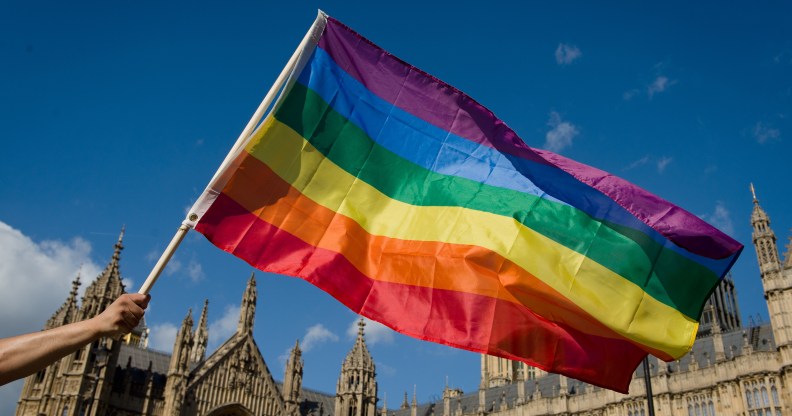MPs and peers say regulations should cover schools

A protester holds a rainbow flag outside the Houses of Parliament in central London on June 3, 2013, as protesters gather in support of same-sex marriage (LEON NEAL/AFP/Getty Images)
The parliamentary Joint Committee on Human Rights has produced a report on the Sexual Orientation Regulations that says there can be no exemptions for church-run agencies.
The committee, which is made up of peers and MPs, also said that the regulations should be extended to cover schools, even ones run by religious groups.
The committee praised the SORs as a significant human rights enhancing measure, and reiterated their support for religious organisations to protect freedom of conscience, religion and belief,
However, they said that the proposed opt-outs sought by the Roman Catholic Church for their adoption services would conflict with the right of gay people not to be discriminated against in their access to goods and services.
The chairman of the committee, Labour MP Andrew Dismore, commented:
“Nobody should be required to perform same-sex marriages, or to admit homosexual people to their organisations, if it would be against their religious beliefs.
“But any wider exemption, to allow religious bodies to discriminate on the grounds of sexuality when providing goods, facilities and services, or performing public services, cannot be justified.”
The section of the report on schools contained some wide-ranging proposals to extend the regulations:
“To schools and the curriculum, without an exemption for faith-based schools, so that homosexual pupils are not subjected to teaching that their own sexuality is sinful or wrong.”
The regulations are expected to outlaw discrimination when schools choose pupils and access to and provision within all schools, but it is uncertain if they cover the curriculum or protect LGB children from harassment in school.
There is a protection against harassment in the Northern Ireland SORs that covers schools.
The government are expected to publish the regulations covering England, Wales and Scotland next week.
Dr Evan Harris, a Lib Dem MP and honourary president of the party’s gay caucus DELGA, told PinkNews.co.uk:
“Northern Ireland SORs cover schools, even if the government thinks they do not.
“It is not clear if the Great Britain regulations may be worded in the same way.
“We do not know if the GB regulations will cover school curriculums.”
Dr Harris said he would be astonished if there was an exemption for faith schools in the regulations to be published next week.
He also spoke to PinkNews.co.uk about the issue of harassment. It is expected that, unlike the NI regulations, the ones for the rest of the UK will not contain protection against harassment.
Stonewall, who has been working closely with the government on the regulations for England, Wales and Scotland, said they would differ from those in Northern Ireland.
“It is quite a technical issue to do with the legislative framework, which differs from that in Northern Ireland,” explained Alan Wardle, director of parliamentary and public affairs for Stonewall.
The government is currently conducting a review of discrimination laws, which will include an overhaul of all harassment legislation.
The review has been going on for over two years, is designed to try to simplify and improve the current situation.
Mr Wardle assured the gay community that the exclusion of harassment regulations from the SOR in Britain was not a cause for concern:
“The forthcoming laws on goods and services will be robust and comprehensive and we have taken legal advice to ensure that issues like homophobic bullying will be covered,” he said.
Dr Harris said:
“We have been told that the GB regulations will not contain harassment. My view is that harassment should be covered but that it should be narrowed.
“In Northern Ireland schools are significantly restrained by the harassment provisions.
“In Religious Education lessons they can teach that the Roman Catholic church, for example, thinks that homosexuality disordered, but the teacher cannot instruct the class that homosexuality is a sin as that would violate the dignity of a gay child and constitute harassment.
“I do not think church schools understand that they will have to be careful.”
He called for similar protection in the rest of the UK:
“I would like a slightly narrower definition of harassment generally but I still think one that says it shall be an offence to harass or create an intimidating environment and would stop teachers in schools telling children they are sinful because of their sexuality or that of their parents.”
In response, a Department for Education and Skills spokesman said:
“We trust teachers to use their professional judgement to decide which resources or publications can support teaching and learning in the classroom.
“If parents have concerns about materials being used they should discuss these with the school. But it is inaccurate to suggest that the regulations will require schools to promote gay rights or homosexuality in schools.
“Existing guidance makes clear that teaching should meet the needs of all young people whatever their family circumstances or developing sexuality and that all topics related to sex and sexuality are taught in a way that is age-appropriate.”
The government will have to publish the Sexual Orientation Regualtions soon. It is thought that the most likely date is 5th March.
The regulations will need an affirmative vote in committee and then on the floor of both Houses of Parliament.

